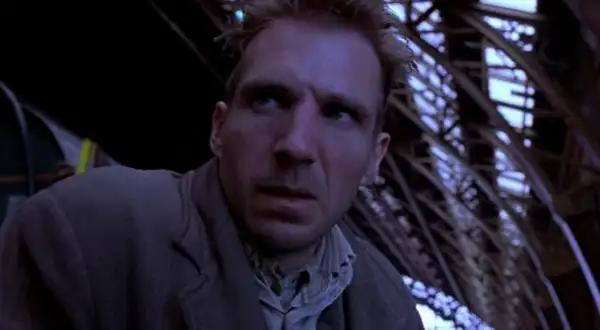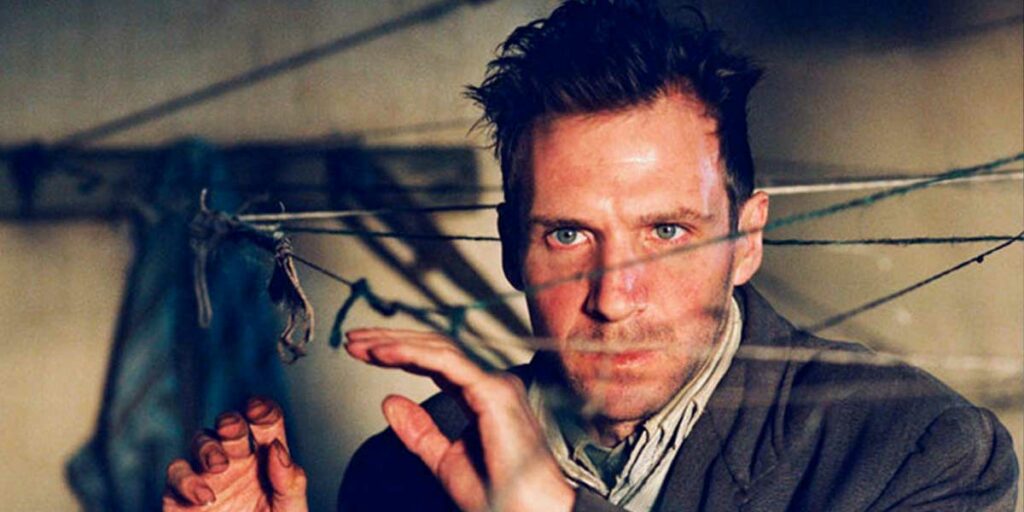Cronenberg’s controlled direction and Fiennes’s mesmerizing performance make Spider a riveting portrayal of one fractured mind haunted by a painful past.
There are few directors who can match David Cronenberg in the presentation of intricate psychological character studies. Though Spider offers neither the director’s obsession with horrifying bodily transformations (The Fly, Crimes of the Future) nor his usual exploratory pursuits of the secrets of niche underworlds (Crash, Eastern Promises), it nevertheless unveils something as darkly compelling: a haunting journey into the recesses of one disturbed mind.
Based on a novel by Patrick McGrath, the film presents the 1980s and thirty-something year old Dennis Cleg (Ralph Fiennes), a man with a history of schizophrenia who makes his way to East London’s boarding house for the mentally ill, run by stern Mrs Wilkinson (Lynn Redgrave). As Cleg settles down into his new home, his environment stirs his recollections of his childhood, unravelling to us some traumatic events that happened when Cleg was a little boy (nicknamed “Spider”) (Bradley Hall) living with his parents in the same working-class area of London.
Then, as an introverted boy, Cleg tried to make sense of his parents’ strange relationship and his father’s wayward nature. His father Bill (Gabriel Byrne) was a plumber who liked drinking in pubs, while his wife (Miranda Richardson) sat at home. When another woman appeared in Bill’s life – prostitute Yvonne (also Richardson), little Denis’s protective instincts, aversion to lewd sexuality and vivid imagination all led him to face and then try to disentangle a web of deceptions, secrets and suppositions.
A number of films of the late 1990s and early 2000s focused on the topic of that thin line that sometimes separates reality from make-believe. Mulholland Drive, A Beautiful Mind, Abre Los Ojos/Vanilla Sky, and The Machinist are just a few examples that fit into this pattern of films that play with the presentation of an illusionary reality or realistic illusion. Spider is not that far behind, portraying a man who lost his grip on actuality, and evoking Freudian psychology. As a boy, Dennis probably tried making sense of his slowly awakening adolescent urges, and the relationship between men and women. It was also probably a bit hard and puzzling for him to start seeing his mother as both: a caring, nurturing figure, on the one hand, and an object of desire on the part of other men, on the other.

In the fashion of powerful first lines of classic novels, Cronenberg’s opening sequences are also entrancing cinematic entrees, providing plenty of food for thought. Spider’s one is no different. A train arrives into a London station and we are shown people leaving it before our ever-suspicious, muttering-to-himself, four-shirts-wearing protagonist, Dennis Cleg, struggles down onto the platform. Ralph Fiennes’s performance is nothing short of remarkable, and the actor immerses himself fully into a difficult study of one tormented psyche. In this largely non-verbal role, Fiennes’s facial expressions speak volumes. Miranda Richardson and Gabriel Byrne are also perfectly cast as husband Bill and his dutiful wife, and Peter Suschitzky’s muted cinematography leaves only a positive impression.
As Cronenberg’s other films, Spider also has the distinction of evoking the cosy intimacy of a well-staged play. This is because, firstly, the film’s full attention is on one intriguing character. But, also, aided by a distinctive camera-work, Cronenberg sets the tone of an intimate setting and claustrophobia engulfing a man, with his mind feeling “trapped” and unable to make sense of his self-constructed reality. In Cronenberg’s A History of Violence, that self-built trap was the protagonist’s own hidden criminal past, in Dead Ringers, it was two minds’ illusion of a safe twinship nest built to exclude others. And, in Spider, that ambush is a man’s childhood trauma that does not quite go away and which we uncover slowly as the protagonist let us in on more and more horrifying details.
David Cronenberg’s fascination with psychological disturbances and dualities is given full vent in Spider, a picture that fuses the worlds of reality and imagination, the past and the present. The film’s mental roadmaps are like cobweb threads intersecting and leading to an unforeseen, revelatory finale, but not before certain clues are dropped that hint at what really happened in Cleg’s childhood. Spider is an intense character-driven film that also emphasises the isolation, loneliness and misunderstanding often faced by people suffering from mental illness.
Spider is now available to watch on digital and on demand.

